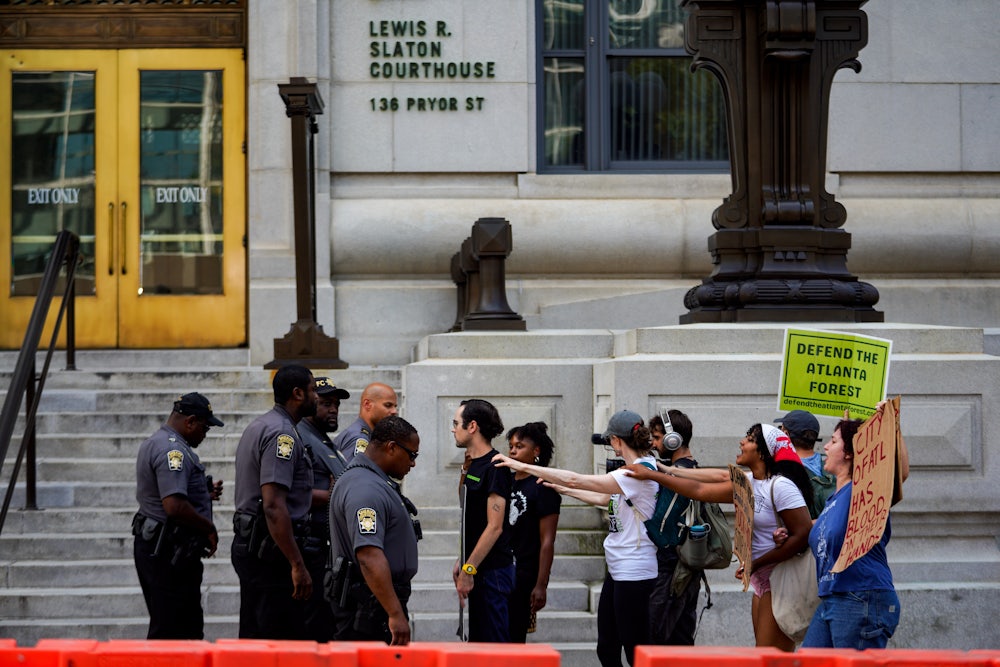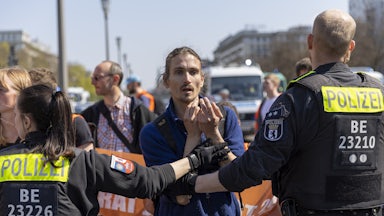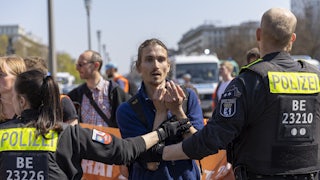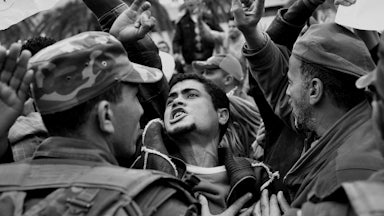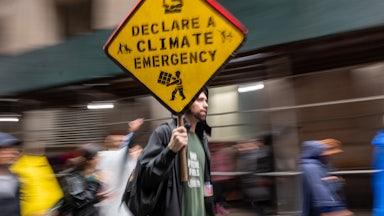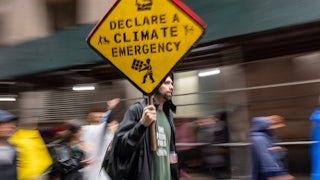A reimbursement of $11.91 for glue. Paying $19.42 for “harm reduction supplies.” Having camping gear in your truck. Handing out flyers.
These extremely normal actions might not seem like grounds for charging dozens of people with racketeering and criminal conspiracy. But that hasn’t deterred prosecutors in Georgia from charging 61 members of the #StopCopCity movement this month under the state’s Racketeer Influenced and Corrupt Organizations, or RICO, Act, a state-level version of the federal statute wielded with dramatic effect against the Mob in the 1980s. The indictment throws into sharp relief the sweeping discretion prosecutors have to determine not only who to bring criminal charges against but also the severity of those charges and the consequences prosecutorial discretion can have for entire movements.
The #StopCopCity movement is a community-led effort to oppose the construction of a sprawling police training facility in the heart of “one of Atlanta’s largest remaining green spaces.” Since the Atlanta City Council approved the project in 2021, the movement to stop “Cop City” has made national headlines—especially after local, county, and state law enforcement began escalating their efforts to suppress resistance to the project, beginning in late 2022. Before this month’s RICO charges, the state’s aggressive policing of the movement included the fatal police shooting of 26-year-old activist Manuel “Tortuguita” Terán in January; charging nearly two dozen protesters with domestic terrorism in March, most for nothing more than trespassing; and deploying a SWAT team to raid the nonprofit Atlanta Solidarity Fund and arrest three community organizers in May.
To an ordinary observer, the state’s response to the movement seems so extreme as to be cartoonish. But officials in Atlanta are drawing from a playbook that relies on dramatically increasing the consequences for civil disobedience and, in the process, criminalizing otherwise lawful, First Amendment–protected activities. Police play a leading role by carrying out surveillance, harassment, raids and mass arrests. State and local officials do their part by narrowing avenues for state-sanctioned protest, closing off some routes entirely. Then, when protesters do manage to find avenues to demonstrate, it’s prosecutors who take the baton.
Prosecutors have always had an outsize degree of discretion in our criminal legal system, and have always been an integral part of repressing progressive protest movements. But what’s unique about this moment, and the way environmental protest is getting criminalized, is the increased amount of anti-protest legislation that gives prosecutors more leverage—both directly in terms of new charges they can bring but also by setting the tone around the idea that protest movements deserve these kinds of draconian legal penalties. These new laws are the direct result of corporate and energy interests trying to squash resistance to their projects—and represent a chilling new chapter in how the law will handle disobedience.
Over the past decade, environmental and racial justice protests across the country have become the proving grounds for aggressive prosecutorial strategies. State prosecutors in North Dakota charged more than 800 people who were arrested at Standing Rock protesting the Dakota Access Pipeline between late 2016 and early 2017. While police turned water cannons on demonstrators in below-freezing temperatures, federal prosecutors were busy preparing felony charges against Indigenous water protectors for starting a wood fire in the middle of a road. When Democracy Now! journalist Amy Goodman was charged with rioting for reporting from the protest site, North Dakota’s state’s attorney publicly defended the decision on the basis that Goodman’s reporting was “justifying the protest actions.” As Standing Rock cases made their way to state court, prosecutors began calling for protesters to reimburse the state for the costs of their court-appointed lawyers while also dropping and later refiling charges in a pattern one defense attorney referred to as “financial warfare.”
In Minnesota, just a few years later, nearly a thousand people faced charges for protesting the Enbridge Line 3 pipeline through the project’s completion in late 2021. Prosecutors charged dozens of people with felonies under increasingly bizarre legal theories: One man was charged with felony theft for locking himself to construction equipment. Two people were charged with felony aiding attempted suicide for climbing together into nonoperational segments of pipe. Another was charged with felony obstruction for sitting in a bamboo tower placed in an access road. In January 2022, the Center for Protest Law and Litigation released documents showing that Minnesota prosecutors even sought reimbursement from the state’s Enbridge-funded “public safety escrow account” for the cost of prosecuting Line 3 protesters. Enbridge paid over $8.6 million to police and other state agencies involved in the project, including reimbursements for riot gear and zip ties, according to reporting by Grist and the Center for Media and Democracy.
These prosecutors have been helped by a wave of new anti-protest legislation in states across the country. Aided by conservative interests—many of them funded by the oil and gas industry—state legislators have been hard at work expanding the reach and severity of the criminal laws at prosecutors’ disposal, targeting protests against police violence and new fossil fuel infrastructure. Energy companies and law enforcement groups have invested heavily in these efforts. In the wake of Standing Rock, 19 states have passed critical infrastructure trespass bills taking aim at protests against pipeline projects. Many of these bills were based on legislation drafted by the American Legislative Exchange Council, a right-wing network financed partially by Koch Industries and other major energy and business interests.
These laws not only heighten the penalties for simple trespass if the property in question is owned by a pipeline company; some also criminalize organizations and individuals that provide protesters with any form of material support—a strategy used by the Georgia prosecutors. Legislators in Oklahoma and Iowa passed laws to protect drivers who hit demonstrators in the street; the bill sponsor in Oklahoma spoke in defense of a truck driver who hit multiple people protesting the murder of George Floyd by Minneapolis police. In Tennessee, a weeks-long demonstration against police brutality outside the state Capitol inspired lawmakers to heighten the penalties for a range of protest tactics, including camping on state property—now a potential felony.
Legal repression of progressive movements is not new, and felony charges for protesters have some precedent. Some organizing tactics carry greater risks than others: Every major social movement in the history of the United States has relied on both legally protected First Amendment activities and acts of civil disobedience that demonstrators know might result in arrest for a range of offenses—typically misdemeanors. Civil rights activists planned sit-ins knowing they would be arrested for trespass or disorderly conduct. During the AIDS crisis, activists staged “die-ins,’’ where they were arrested and charged with trespass or blocking traffic. Many participants in these movements never engaged in civil disobedience and instead focused on strategies like mutual aid and community education. But by Atlanta prosecutors’ new logic, any single unlawful act can transform a whole range of free speech and organizing into potentially serious crimes: donating food, operating a bail fund, writing and distributing leaflets and flyers.
Sometimes protesters break the law—but the definition of illegal activity has become much broader now that state legislators are actively expanding the scope of what counts as breaking the law. These strategies are mutually reinforcing: Draconian prosecutions fuel narratives around the alleged extremism of protest movements that can, in turn, justify more aggressive policing and surveillance of activists as well as increasingly severe anti-protest laws. Just three days after the Cop City RICO indictment became public, protesters obstructing construction of the Mountain Valley Pipeline in West Virginia told The Guardian that police were threatening them with felonies and domestic terrorism charges.
Civil disobedience is rarely the first path movements take. Weeks before protests began, the Standing Rock Sioux Tribe sued over permits for the Dakota Access Pipeline—the pipeline company, Energy Transfer Partners, kept digging while the lawsuit was still pending in court. Government agencies subsequently issued a joint statement calling on Energy Transfer Partners to “voluntarily pause all construction” near the project site, which the company ignored. Before any protesters occupied the Weelaunee Forest to oppose Cop City construction in late 2021, Atlanta residents spent 17 hours expressing opposition to the project during public comments before the City Council that September. The City Council voted to move forward anyway. This summer, organizers collected over 100,000 signatures in favor of letting Atlanta residents vote on the construction of Cop City in November, but Atlanta city officials have repeatedly challenged the referendum drive—in court, in the press, by instituting draconian signature verification requirements, and finally by refusing to verify the signatures when delivered in person.
Against this backdrop, the broad discretion prosecutors have regarding what types of charges to file and whom to target for prosecution presents an increasing risk to our fundamental rights to speak out and organize. Prosecutions can drag on for months, even years. In the meantime, those facing charges also face significant restrictions on their ability to continue organizing, as well as ongoing risks to their employment and housing. Despite the often meandering and obscure bureaucracy of the U.S. criminal legal system, it is critical to keep public attention on these prosecutions. Injustice thrives in empty courtrooms.
But other futures are possible. Just last week a judge dismissed nearly three-year-old charges against Line 3 protesters Winona LaDuke, Tania Aubid, and Dawn Goodwin, ultimately finding that “to criminalize their behavior would be the crime.” In the wake of mass arrests following the murder of George Floyd, prosecutors across the country dropped the vast majority of cases against protesters in their cities and counties, some explicitly citing protesters’ constitutional and civil rights. Movements continue to mobilize community-led jail and court support for those facing prosecution to demand transparency and accountability at every step of the legal process.
For their part, activists in Atlanta have responded to prosecutors’ much-anticipated RICO indictment with more public outreach, more protest, and more solidarity. The message from the Stop Cop City movement, like so many movements before it, is clear: There is a cost greater than the costs of repression, and that’s the cost of doing nothing.
